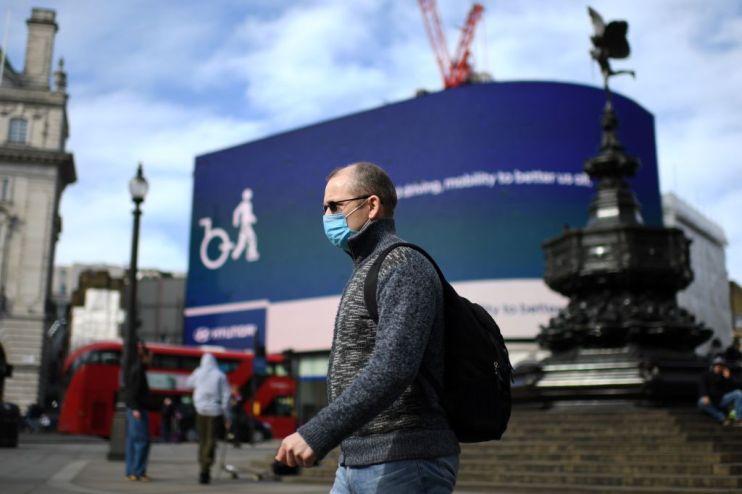Coronavirus: London escapes new restrictions, but City Hall says it won’t last

London will not have any new Covid restrictions imposed on it, after Prime Minister Boris Johnson today outlined a new three-tier alert system. However, Sadiq Khan has warned this could change within days.
London will be put into the lowest level category, medium risk, meaning that the current restrictions will remain the same.
Read more: Government set to unveil new UK coronavirus restrictions
The current restrictions for all areas in the medium risk category include a 10pm curfew on hospitality venues and a ban on more than six people meeting at a time.
With Covid cases in London rising, the capital may soon face being put into the second alert level, high risk, which would mean a ban on household mixing indoors and other restrictions.
People living in high risk category areas – such as Manchester, Newcastle, Leeds and Birmingham – will still be able to meet up in groups of six outdoors.
Speaking in a televised press conference in the evening, Johnson said people would soon be able to type in their postcodes at “gov.uk” to see which restrictions apply in there area.
Before the Open newsletter: Start your day with the City View podcast and key market data
A spokesperson for Sadiq Khan said London could be just days away from joining other major cities in being put into the high risk category.
“The number of cases is rapidly increasing and all the indicators we look at are moving in the wrong direction,” they said.
London First chief executive Jasmine Whitbread said the capital appeared to be on “borrowed time”.
“While the government must balance public health with the wider economic and mental health of the nation, it should do everything possible to avoid another total lockdown,” she said.
Liverpool put in highest category
Liverpool will be put into the highest category on Wednesday, very high risk. That will mean that most hospitality venues will shut and social mixing will be banned.
Johnson said any area put in the high risk category will have these restrictions as a “baseline”. He added that extra conditions may be imposed depending on local factors.
Liverpool, for instance, will also have gyms, leisure centres, betting shops, adult gaming centres and casinos closed.
“We want to create the maximum possible local consensus behind this more severe local action, so in each area we will work with local government leaders on the additional measures which should be taken,” Johnson told parliament in the afternoon.
The Prime Minister also spoke about how he did not want to impose another national lockdown. But he said that “the bleak mathematics” showed the need for local changes.
Read more: NHS boss: More in hospital with Covid now than when first lockdown began
“We must act to save lives and the evidence shows that in changing our behaviour…our actions are saving lives,” he said.
Labour leader Sir Keir Starmer said the Opposition would “look at the small print of the Prime Minister’s statement”. He derided Johnson for taking too long to come up with concrete solutions to the second Covid wave.
Rishi Sunak talks up economic plan
Speaking alongside the PM at the evening press conference, chancellor Rishi Sunak said there was “a comprehensive plan” in place to “protect jobs”.
He restated the new support for closed businesses, which was announced last week. Sunak said that if businesses are forced to close by the new system of restrictions, the government will pay two-thirds of employees’ wages. The scheme will run for six months.
The chancellor said businesses forced to close can claim a cash grant of up to £3,000 per month. It will not need to be repaid.
The job support scheme announced in September will apply to businesses that can partially open. It will see the government pay up to 22 per cent of the wages of workers who can come back part time from November. It will replace the much more generous job retention scheme.
“We’re putting in place support that we believe is both sustainable and affordable for the long term,” Sunak said.
Yet some local leaders, business groups and trade unions have argued that the new support is not strong enough.
The mayors of Greater Manchester, the Sheffield and Liverpool city regions and North Tyne last week said the policies do not go “far enough to prevent genuine hardship, job losses and business failure this winter”.